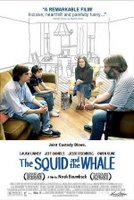For those of you who have your own blogs, or write in other forms, such as essays, short stories or novels, how many times have you been in a situation, and then been asked if you were going to write about it? Or been told that you should write about it? (And do you find that as annoying as I do?) I'm sure Noah Baumbach didn't hear those questions from his parents as they were going through a divorce, but I thought about that often while watching The Squid and the Whale. How long was this movie in his head? Did he know he was going to write or make a film about this ordeal as it was happening? Maybe he was taking notes the whole time.
I'm sure Noah Baumbach didn't hear those questions from his parents as they were going through a divorce, but I thought about that often while watching The Squid and the Whale. How long was this movie in his head? Did he know he was going to write or make a film about this ordeal as it was happening? Maybe he was taking notes the whole time.
For any child of divorce (or anyone who's gone through a divorce), I imagine you'll find a lot to relate to - and maybe painfully so. My parents never split (though once came close), and there were a couple of scenes that rang extremely true. But that makes this film sound rather depressing, and it really isn't.
Maybe it's laughing to prevent from crying, but there's so much humor that is mined from these situations. The parents' negotiations over who gets the kids on which day and whose stuff belongs to whom. The kids' comparing new homes to old homes. Deciding whose side to take. Discovering details that children probably shouldn't learn about their parents - at least not until much later in life. And maybe that's what this film is really about: finding out that your parents are actually people with flaws and weaknesses, not just archetypes and role models.
That premise is embodied in Jeff Daniels' character, a supremely pretentious, arrogant writing instructor - he refers to Kafka as one of his colleagues, and to Tale of Two Cities as "minor Dickens" - whose literary fame has long since passed, yet still feels he's entitled to adoration from the people in his life. The only one who idolizes him anymore is his older son, who's trying that pretentiousness - to sound smart, he says The Metamorphosis is "Kafka-esque" - on for himself. Yet Laura Linney's (a Fried Rice Thoughts favorite - love her) character isn't blameless, either. She's a bit too honest with her children about the various affairs she's had, including one with William Baldwin (who is still working, if you were ever wondering).
One sidenote: There's a very Wes Anderson ("Anderson-esque"?) tone to the movie, so if you're a fan of his work, you'll probably enjoy this film. It fits into that world very well, with that same sort of painful humor, the same types of deplorable, yet charming characters, and a similar exploration of the relationships between children and their parental figures. (Maybe that shouldn't be a surprise, since Anderson is a producer on the film.)
As I write this, I find myself envying Baumbach for making this movie and working through his memories, and the issues that surely come with them. I imagine it was extremely therapeutic. And I'm kind of inspired by that. I should probably warn my family right now: I'm bringing a notebook to Thanksgiving dinner. And if you feel the need to suggest what might make a good story, don't worry - I'm probably already ahead of you.
Monday, November 21, 2005
Movie Week -- The Squid and the Whale
Posted by
Ian C.
at
10:30 AM
![]()
Subscribe to:













